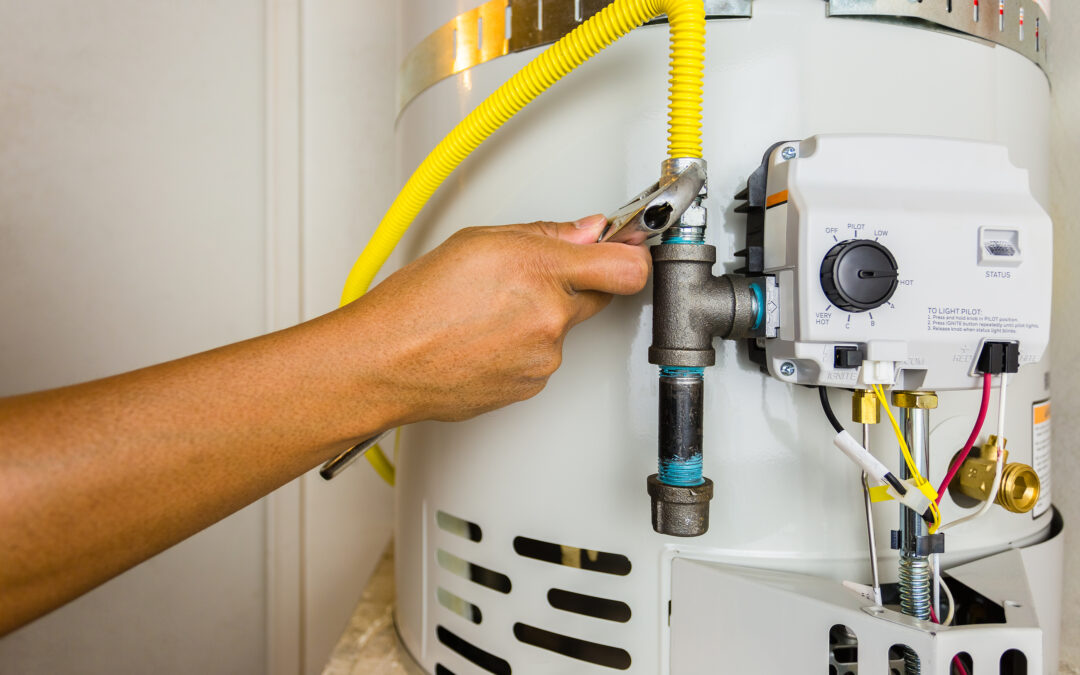The debate between tankless water heaters vs. tank water heaters is more than just a matter of preference; it’s a decision with long-term implications for any homeowner. From energy efficiency to installation costs, each type has its unique set of features.
In this blog post, we break down the pros and cons of both tankless and tank water heaters, providing a clear comparison to help you make the best choice for your home’s needs.
What is a Tank Water Heater?
A tank water heater is a traditional type of water heater that’s common in many households. It consists of a large cylindrical tank that stores and heats water. The capacity of these tanks typically ranges from 20 to 80 gallons. Water is heated within the tank by either gas burners or electric elements and is maintained at a set temperature until needed. When you turn on a hot water tap, hot water from the top of the tank is delivered through your home’s plumbing. As the hot water is used, the tank refills with cold water at the bottom, which is then heated.
PROS of Tank Water Heaters
- Lower Initial Cost: Tank water heaters generally have a lower upfront purchase and installation cost compared to tankless models. This makes them a budget-friendly option for many homeowners.
- Simplicity in Operation and Maintenance: These systems are relatively straightforward in their design and operation. This simplicity translates to easier and often less expensive maintenance and repairs.
- Reliable and Consistent Hot Water Supply: As long as the tank’s capacity isn’t exceeded, tank water heaters provide a consistent supply of hot water. They are ideal for simultaneous usage, like doing laundry and taking a shower.
CONS of Tank Water Heaters
- Larger Physical Footprint: The bulky size of the tank means they require more space, usually in a basement or a dedicated closet. This can be a drawback in smaller homes where space is at a premium.
- Limited Hot Water Supply: The amount of hot water available is limited to the tank’s capacity. Once the hot water in the tank is used up, you have to wait for the new water to heat up, which can be inconvenient during high-demand times.
- Shorter Lifespan: Traditional tank water heaters typically last between 10-15 years, which is shorter than the lifespan of tankless models. This means they need to be replaced more frequently.
- Higher Energy Costs in the Long Run: Tank models continuously heat water to maintain the set temperature, leading to higher energy usage and costs, especially during periods of low usage. This inefficiency can be a significant factor in higher utility bills over time.
What is a Tankless Water Heater?
A tankless water heater, often referred to as an on-demand water heater, is a modern solution to heating water that doesn’t involve a storage tank. These heaters rapidly heat water directly as it flows through the device, and do not retain any water internally except for what is in the heat exchanger coil.
How They Work
When a hot water tap is turned on, cold water travels through a pipe and into the tankless water heater unit. Here, an electric element or gas burner heats the water. As a result, tankless water heaters deliver a constant supply of hot water. The output, however, limits the flow rate. Typically, tankless water heaters provide hot water at a rate of 2-5 gallons per minute. Gas-fired tankless water heaters generally produce higher flow rates than electric ones.
PROS of Tankless Water Heaters
- Energy Efficiency and Lower Operating Costs: By heating water only when it’s needed, tankless water heaters are generally more energy-efficient than traditional tank models. This efficiency can translate into lower utility costs over time.
- Continuous Supply of Hot Water: They can deliver an endless supply of hot water, making them ideal for families or situations where the demand for hot water is high.
- Longer Lifespan: Typically, tankless water heaters have a longer lifespan than tank models, often lasting more than 20 years. This is a significant advantage over the 10-15 year lifespan of traditional tank heaters.
- Space-Saving Design: Their compact size allows for installation in smaller or tighter spaces, freeing up room in homes where space is at a premium.
CONS of Tankless Water Heaters
- Higher Initial Cost and Installation Complexity: Tankless models generally come with a higher upfront cost for both the unit and installation. Installation can be more complex, particularly if additional work like upgrading gas lines or venting systems is required.
- May Require Upgrades to Existing Gas Lines or Electrical Systems: To accommodate the high power requirements of tankless units, existing electrical and gas systems may need to be upgraded, which can add to the overall cost and complexity of installation.
- Inconsistent Water Temperature When Multiple Outlets are Used Simultaneously: Tankless systems can struggle to supply consistent hot water to multiple fixtures at the same time. This can result in temperature fluctuations when multiple taps are in use.
Factors to Consider When Choosing a Water Heater
Selecting the right water heater for your home involves considering various factors. These are not just about immediate needs, but also about long-term efficiency and costs. Here are some key factors to consider:
Household Size and Water Usage
Capacity Needs
The size of your household and your daily hot water usage are crucial factors. For larger families or homes with high water usage, a tank water heater might be more suitable due to its capacity. On the other hand, smaller households or those with lower water consumption might find a tankless water heater more efficient and cost-effective.
Peak Hour Demand
Consider the number of people and appliances needing hot water simultaneously. Tankless water heaters can struggle with supplying multiple outlets at once, while tank heaters have a limit based on their capacity.
Energy Efficiency and Environmental Impact
Energy Consumption
Tankless water heaters are generally more energy-efficient than tank models, as they only heat water on demand. This can result in lower utility bills and reduced environmental impact.
Eco-Friendly Options
If environmental sustainability is a priority, look into models with higher Energy Star ratings and those that use eco-friendly fuels or have lower greenhouse gas emissions.
Space Considerations
Installation Space
The amount of available space can be a deciding factor. Tank water heaters require a significant amount of space, usually in a basement or utility room. Tankless heaters, being much smaller, offer more flexibility in terms of installation location.
Accessibility for Maintenance
Ensure that the installation location is easily accessible for regular maintenance, which is essential for the longevity and efficiency of the water heater.
Budget and Long-Term Costs
Initial Investment
Tankless water heaters typically have a higher initial cost but can lead to long-term savings on utility bills. Tank heaters, being cheaper upfront, might be more suitable for a limited budget.
Operating and Maintenance Costs
Consider not just the purchase price but also the long-term operating and maintenance costs. Tankless models might have lower operating costs but can have higher maintenance or repair costs.
Replacement and Lifespan
Factor in the potential lifespan of the water heater. Tankless models generally last longer than tank models, which might mean fewer replacements over the years.
In this blog, we’ve explored the distinct differences between tank and tankless water heaters, each with its unique set of pros and cons. To recap:
- Tank Water Heaters are generally more cost-effective upfront and simpler in operation, offering a consistent hot water supply but with limitations on capacity and efficiency.
- Tankless Water Heaters stand out for their energy efficiency, space-saving design, and continuous hot water supply, though they come with a higher initial cost and potential need for system upgrades.
The right choice depends on various factors including household size, water usage habits, energy efficiency priorities, space availability, and budget considerations. We encourage homeowners to carefully weigh these factors based on their individual needs and circumstances.
For personalized advice and expert installation, consider consulting with Landa Plumbing. Our experienced team can help you navigate these choices and ensure that your home is equipped with the most suitable water heater.

FAQs
Q: How much more efficient is a tankless water heater compared to a traditional tank model?
A: Tankless water heaters are typically 24% to 34% more energy-efficient than traditional tank models for homes that use 41 gallons or less of hot water daily. For homes using more, the efficiency gains can be 8% to 14%.
Q: Can a tankless water heater really provide unlimited hot water?
A: While a tankless water heater provides a continuous flow of hot water, it’s limited by its flow rate, which is typically around 2-5 gallons per minute. This means it can struggle to supply multiple outlets simultaneously.
Q: How long does a tank water heater last compared to a tankless model?
A: Tank water heaters usually have a lifespan of about 10-15 years, whereas tankless water heaters can last over 20 years with proper maintenance.
Q: Are tankless water heaters more expensive to repair?
A: Repairs for tankless water heaters can be more expensive and complex due to their advanced technology. However, their longer lifespan often offsets these costs over time.
Q: What size of tank water heater do I need for a family of four?
A: A family of four typically requires a tank water heater with a capacity of 40 to 60 gallons, depending on the simultaneous usage of hot water in the household.
For any further questions or specific inquiries about your home’s water heating needs, don’t hesitate to reach out to Landa Plumbing for expert guidance and services.

